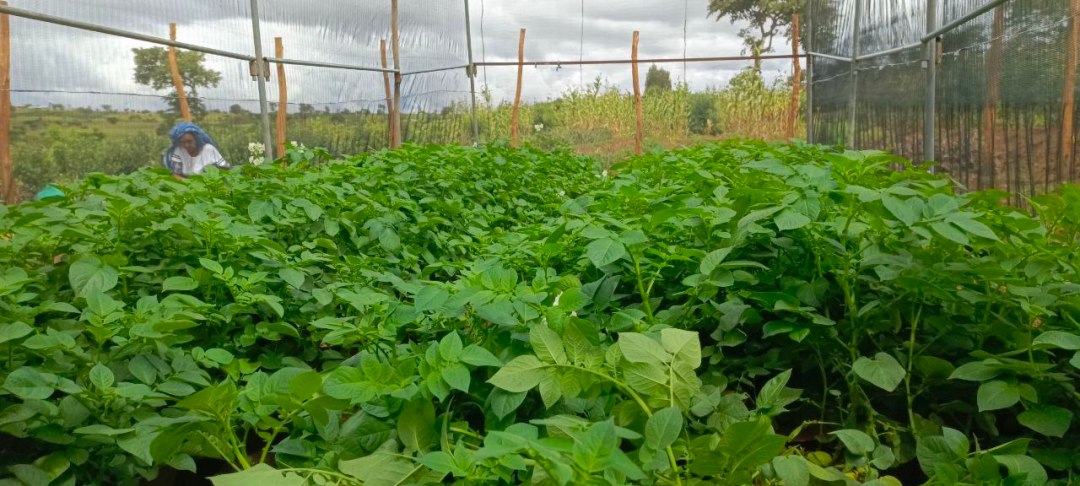Potato production plays a vital role in ensuring food security, particularly during the critical period preceding the harvest of grain crops. However, the country faces challenges in achieving optimal potato yields, primarily due to the limited availability of high-quality seed potatoes. In response to this issue, initiatives have been undertaken to promote the production of mini tubers in screen houses as a means of enhancing the supply of clean and healthy seed potatoes at the local level.
Potato cultivation in Ethiopia covers approximately 314,652 hectares, with an estimated total tuber yield of 4,186,455 tons during the meher and belg seasons combined. Despite the extensive cultivation, the average yield remains low at 13.3 t/ha, highlighting the need for interventions to improve seed quality and ultimately enhance productivity and profitability for smallholder farmers.
One of the key factors contributing to the low potato yield in Ethiopia is the limited availability of disease-free seed potatoes. The continued use of farmer-saved seed potatoes without renewal from a reliable source has led to the spread of seed-borne diseases, resulting in significant yield and quality losses. To address this challenge, efforts have been made to explore alternative strategies for producing high-quality seed potatoes, including the use of mini tubers generated in screen houses.
Mini tubers, produced through tissue culture, offer several advantages in terms of handling, storage, and planting. These small, disease-free tubers serve as the foundation for seed potato production and are crucial in addressing the seed availability gap. By utilizing screen houses, a controlled environment is created, minimizing disease transmission and insect infestation, thus ensuring the production of high-quality and healthy seed potatoes.



While some research centres and private companies have been at the forefront of seed potato production using in vitro-derived mini-tubers, such efforts remain limited in Ethiopia. Therefore, alternative approaches such as farmer-managed quality seed production systems are essential to address the gaps in available quality seed potato supply.
In line with this objective, the RAISE-FS project, in collaboration with the Holeta Agricultural Research Center and Haramaya University, initiated the demonstration and piloting of potato mini-tuber production and management under screen houses on farmers’ fields. The aim is to address the shortage of potato seed at the local level through training and awareness creation among host farmers, follower farmers, agricultural development agents (DAs), woreda experts, and regulatory bodies to introduce this new method of clean and healthy seed potato production at the community level.
The initiative involved the construction of screen houses on the farms of selected farmers in two woredas (Kersa and Wolmera), targeting two kebeles in each woreda during the main cropping season of 2023. Expert-led training on mini-tuber production under screen houses was provided to host farmers, covering various aspects such as plantlet/mini tuber hardening, soil mixture preparation and sterilization, pot filling, screen house maintenance, establishment and management of potato crops in screen houses, and postharvest handling of mini-tubers.
Feedback from farmers and stakeholders indicated a positive reception towards this new approach of clean and healthy seed potato production under screen houses managed by host farmers with close supervision from experts. The successful demonstration in Kersa woreda showcased remarkable tuber yields achieved at the farmers’ level, reinforcing the potential of mini-tuber production under farmer management to enhance the supply of clean seed potato at the local level.
The experience gained from this initiative underscores the significance of local-level clean and healthy seed production to avoid the bulk transportation of potato seed and prevent the spread of diseases from one location to another. Moreover, it highlights the potential for mini-tuber production under screen houses to alleviate the gap in both the quality and quantity of seed potatoes, thereby contributing to enhanced potato yields and food security.
In the next step, efforts will focus on linking these farmers with seed-producing cooperatives to sustainably supply clean seed potatoes at the community level. By scaling up mini-tuber production, this approach will ensure a continuous supply of quality seed potatoes, contributing to increased yields and food security while creating employment opportunities.

